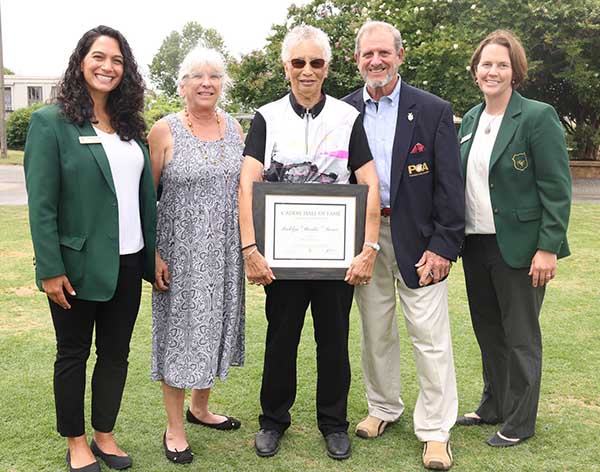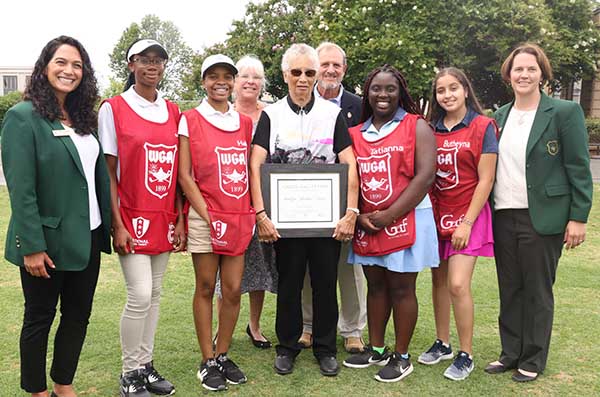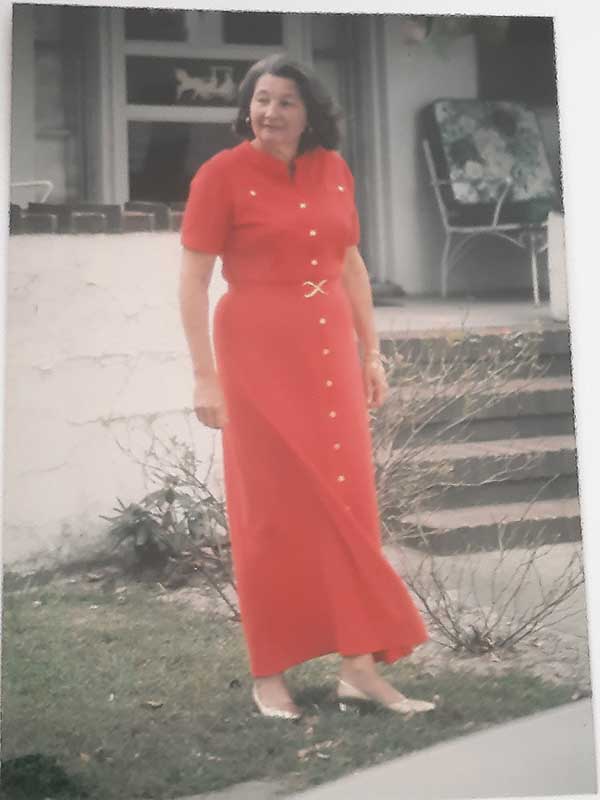
By Bob Denney
PGA Historian Emeritus
Madelyn “Moochie” Turner, inducted into the Caddie Hall of Fame on June 27, 2022, as the first Black female recognized by the Western Golf Association and the Professional Caddies Association, called the honor “the most meaningful of my life.”
Moochie Turner’s story extends beyond the perimeter of a golf course, past who hired her or what tournament she worked. It’s about a woman who overcame racial barriers to impact society through law enforcement and later inspire young women to play golf and give back to others.
It’s about learning the game of golf from her mother, Vernice Turner, a champion amateur player, and her father, David, an entrepreneur in South Jersey who owned a pool hall and a dump truck business that supported highway projects.
Moochie caddied for her mother from age 7 through high school on the United Golfers Association (UGA) regional and national circuit from the 1950s through the 1963. One special week in the summer of 1961, mother and daughter made history.
Vernice and Moochie captured respective women’s open and age-division junior titles in the UGA National Open Championship at Ponkapoag Golf Course in Canton, Massachusetts.
They were featured in the 2010 book, Heroines of African American Golf, by M. Mikell Johnson. Vernice, who passed away in 2009, is a member of the African American Golfers Hall of Fame (2017) and the National Black Golfers Hall of Fame (2021, with Moochie).
“Caddying for my mom was where I learned a lot about the game and a lot about life,” said Moochie, who turns 76 on October 9. “My mom and I were like two peas in a pod. I went on to win three junior UGA championships, and caddying really helped me to develop new relationships.”
During the 1961 UGA Championship, Moochie caddied the first three rounds for her mother, who was paired for one round with Althea Gibson, Renee Powell, and defending champion Ethel Funches.
Gibson and Powell went on to become the first two Black members of the Ladies Professional Golf Association Tour and Funches, one of the UGA’s greatest performers, won seven UGA open titles among 100 local and regional victories.
With the junior division beginning play a day later, Moochie gave up her mom’s bag and Gibson’s professional caddie took over. Vernice went on to win the women’s open title.

“That same week a downpour hit us in one of the earlier rounds and I was the only caddie who didn’t have an umbrella,” said Moochie. “My mom’s club slipped on one shot and went further than her ball. I’m lucky I didn’t get fired.”
Vernice finished her competitive career in 1963, the winner of 12 UGA events, including the 1958 UGA National Women’s Open and the Apex Club women’s championship.
It was that same special 1961 season, this time at Langston Golf Course in Washington, where boxing and avid golfer Joe Louis competed in the men’s UGA division the same week as Vernice and Moochie.
At one point in a round, Vernice and Moochie were overheard by the gallery.
“It was the first and only time that my mother and I had a disagreement over club selection,” said Moochie. “In caddying, the player has the final decision. Well, mom hit her shot and it came up short. She looked at me and I said, ‘Mom, you didn’t hit the stick!”
Louis, who was in the gallery, asked bystanders who was that caddie, and learned it was mother and daughter, who they called “Big and Little Turner.”
After the round, Louis approached Moochie and introduced himself.
“‘Joe said, ‘I never saw a caddie talk to a player like that before in my life,’ ” Moochie recalled, “Then he shook my hand.”
For as long as she can remember, Moochie has carried the nickname that her mother gave her since she was in grade school. Folks said little Madelyn would boldly come up to them and ask for a spare nickel or dime. Her father would later reimburse those same folks.
“I was always mooching off someone or something,” laughed Moochie. “My mom thought I exaggerated it, but it fit.”
Moochie’s father owned a pool hall and a trucking business to help support building highways. David Turner would play golf in rain, snow, or by car lights lighting the fairways and greens at Apex Golf Course in Pomona, New Jersey. Apex became Moochie’s training ground, and Vernice followed her husband’s lead and adapted playing golf in adverse conditions.
Sara Spencer Washington, a local African American entrepreneur and founder of Apex Beauty Products Company, purchased tracts of land for the course and opened the course in the 1940s to players of all races, creeds, nationalities, and economic status. The course has been resold twice in the past half-century, and is now Pomona Golf Course.
Moochie attended Langston University in Oklahoma, that state’s only historically Black university, and graduated in 1968 with a degree in Health, Physical Education and Recreation. She went on to work as an assistant court clerk, and in the recreation department in Ocean City, New Jersey. A matron in the Ocean City Police Department heard Moochie express a desire to be in law enforcement.
“I tried to apply to the FBI while in high school,” said Moochie. “I actually got a letter from J. Edgar Hoover, who wrote that the FBI didn’t accept females. I wish I had been able to keep that letter.”
That letter would be a prized collector’s piece, considering what happened next.
Following Hoover’s death in 1972, the FBI opened its doors to women applicants. A matron in the Ocean City Police Department heard Moochie express a desire to be in law enforcement and recommended her for an interview.
Moochie applied for a Bureau position and was accepted for a position in the Learning Resources Center, and later as an agent-in-training. When offered a field position, she declined, as she deemed “it was too far from home.”
But Moochie got a second opportunity with the FBI 1976, learning of a vacancy in the Bureau’s Fitness & Defensive Tactics Unit. Because of her college degree, she was a candidate.
“I took tests in swimming, running, and overall fitness, and was accepted,” said Moochie, who remained in her instructor’s role 34 years until her retirement in 2007.
At her retirement, the Bureau presented her a set of Nike Slingshot golf clubs. Powell later asked why her friend did not play golf during her professional career.
“I didn’t think I could handle both of them at the same time. There were some aspects of the training that I had to maintain to continue to be an instructor,” she said. “I had martial arts and a lot of running. The defensive tactics took a priority, because someone’s life or death depended upon my ability to teach.”
Moochie’s Caddie Hall of Fame induction came during a reception hosted by the LPGA at the Renee Powell Clearview Legacy Benefit at East Potomac Golf Course in Washington, D.C.
Said Dennis Cone, co-founder with his wife, Laura, of the Professional Caddies Association, “Any good building must have a great foundation and we have come to realize that Moochie and her uplifting story is one of the main blocks missing in the Caddie Hall of Fame to help give us strength to keep growing worldwide. Moochie is a bright star for the future of girls caddying, for golf and the game to help us all rise above and be the best we can be.”
ABOUT PCA
The Professional Caddies Association (PCA) was founded in 1997, with the PCA and Dennis and Laura Cone of Palm Coast, Florida, launching the Caddie Hall of Fame in 1999. Since 2011, the Caddie Hall of Fame (CHOF) has been administered by the Western Golf Association. The CHOF highlights the tradition and importance of caddying by celebrating individuals who have devoted their lives to the game of golf through caddying or by supporting the role of caddies. The CHOF profiles those who have used their experience as a youth caddie toward professional success.
Past inductees include Jim Dent, Charles “Chick” Evans, Joe LaCava, Carl Jackson, Jack Nicklaus, Frances Ouimet, Charles Schwab, Peter Ueberroth, Tom Watson, and Steve Williams.
While the CHOF includes several women special contributors, Moochie and Fanny Sunneson – a longtime caddie for Sir Nick Faldo – are the only female caddies on the elite roster.
“Moochie is a trailblazer and embodies the gold standard of hard work and professionalism,” said Jeff Harrison, WGA senior vice president of advisory and special initiatives. “From personifying the values she learned as a caddie to showing young women everywhere how far the game of golf can take you in life – and now as the first female African American inducted into the Caddie Hall of Fame – she is a true inspiration to us all.”
A resident of Magnolia, Delaware, Moochie has spent her summers – except during the height of the pandemic – assisting Powell at historic Clearview Golf Club in East Canton, Ohio. It is there that Moochie displays a passion for giving back in help youth, women’s and veterans’ programs.
“Moochie is a good example of what you can attain through beginning as a caddie,” said Powell. “She stands alone in her position in life and now earned her place in the Caddie Hall of Fame.”
In a nominating letter nominating for her friend, Powell wrote: “Certainly, her induction will serve as a beacon of light for those who maybe did not realize that golf is for everyone and how being introduced to it through caddying can open many doors.”
A special presentation accompanied the induction, with WGA leaders introducing Moochie to four young female caddies who are working this summer at Langston Golf Course in Washington, D.C. The WGA and National Links Trust are overseeing a youth caddie program for underserved students who hope to one day earn a college scholarship.
“These young women will be able to follow in Moochie’s footsteps and learn the game of golf through caddying,” said Harrison. “This is the future of the game – and it wouldn’t have been possible without the path that Moochie created.”
Moochie Turner’s nickname may link to taking, but she’s lived a life in complete reverse – selflessly giving and inspiring the next generation.
Sponsored by the EVERGREEN YOUTH FOUNDATION ( dba ) PCA Caddie Foundation


